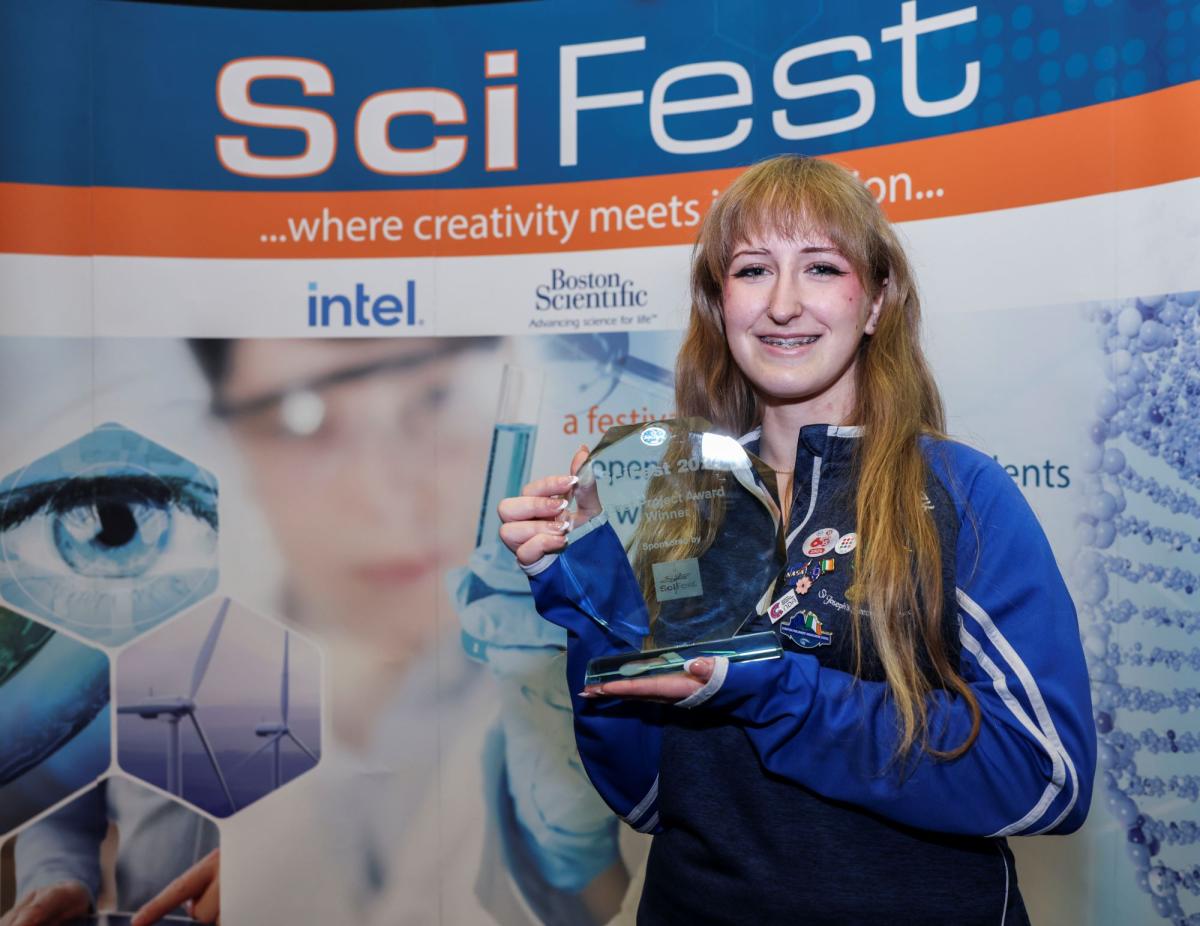

SciFest 2024 winner aims to attend DCU
Zuzanna won the Best Project Award for her project entitled: A measurement of the variance in uniformity of background radiation fields.
“I studied the uniformity and density of background radiation, and I did this through many rounds of readings taking from five Geiger counters that were in my school,” said Zuzanna speaking after the award presentations were completed.
“I want to go to college here at DCU and study astrophysics,” Zuzanna added.
The awards ceremony was hosted by Professor Eilish McLoughlin, Head of the School of Physical Sciences, in a packed auditorium, HG20 in the Nursing building.
"SciFest provides a unique opportunity for second level students to present their STEM projects to STEM professionals from universities and industries,” said Prof McLoughlin.
“Congratulations to all 250 students from 20 schools that presented their innovative and inspiring projects at SciFest@DCU 2024 and we look forward to the many contributions these young people will make to transforming lives and societies for years to come.”
There were 32 science teachers in attendance, along with academics from DCU, the representatives of partner organizations, and hundreds of lively, excited teenagers.
The awards, which are sponsored by Intel, Boston Scientific and EirGrid, are regional finals, with the winners in several categories having the chance to advance to national finals.
SciFest, founded in 2006 is a true celebration of science, technology, engineering, and maths (STEM) education. Spanning all of Ireland it has grown in the 18 years to become Ireland’s largest second-level STEM fair programme. SciFest fairs provide a platform for students to showcase their projects, exchange ideas, and connect with fellow enthusiasts and experts alike. Participation is an exciting opportunity for them to explore, innovate, and share their passion for STEM subjects.
SciFest operates throughout the school year and, being locally and regionally based and free-to-enter, is highly inclusive and accessible. Winners from each regional STEM fair go on to compete at a national final in November. Winners from the national final compete at the Regeneron International Science and Engineering Fair (ISEF) in America and attend the Long Night of Science in Berlin. The SciFest programme is funded primarily by Intel Ireland, Boston Scientific and EirGrid.
Commenting on the SciFest@DCU regional STEM fair Sheila Porter, SciFest Founder and CEO said: “SciFest is more than just an event: it is a platform where students not only showcase their STEM projects but also embark on a journey of self-discovery and empowerment. Through hands-on exploration, engaging discussions, and connections with mentors, role models and peers, SciFest inspires a generation of problem-solvers and innovators. With over 12,000 students participating annually and experiencing a remarkable growth rate of around 20%, SciFest is paving the way for a brighter, more innovative future for all. The increasing participation is thanks to the dedication of teachers, mentors, parents, coordinators in the third level colleges and our partners and sponsors, who continue to support us in inspiring the next generation of problem-solvers. We deeply appreciate their commitment."

Category Awards
Life Sciences
Christopher Carroll, St Kevin’s College. Global warming: past and present
Patrick Sheridan, Naoise O’Dáilaigh, Clongowes Wood College. Investigating the effects of vaping on the human body.
Aneesh Garg. St Conleth’s College. An investigation into the use of hot water treatment and natural preservative solution on various fruits in an attempt to increase their shelf life.
Physical Sciences
Aran O’Donnell. Clongowes Wood College. What are microplastics and why are they a problem.
Zack O’Leary. Clongowes Wood College. Fermented foods and the gut brain axis.
Aaron Leung, Antoni Lesinski. Fingal Community College. Whipping wonders.
David Tanasa. Fingal Community College. Bubble race.
Thomas Pegum, Jakub David, Demarcus Robert. Gonzaga College. Cornstarch based bioplastic.
Elliot Wright, Harrison Lynch Reynolds, Daniel Zharkov Murray. Greystones Community College. Exploring how different materials absorb impact.
Technology
Sophie Monks. St Joseph’s Secondary School. Fine tuning talents: Linking sheet music and motor dexterity.
Davin Gaffney. Clongowes Wood College. Does cost, brand or packaging claims correlate with battery life in a toy testing model?
Rosie Maguire. Eureka Secondary School. A solution to the problem of cognitive decline in teenagers and adults.
Special Awards
Irish Science Teacher’s Award
Fergal Browne, Justin Bi, Ashkan Samali. Castleknock College. Do electrolytes affect running performance?
SciFest Chemistry Award
Esha Sibi Mathew. Loreto College. Bioflourescence
Dawn Meats Agricultural Science Award
Max Kinsella, Clongowes Wood College. How does light pollution affect plant growth?
Regeneron Life Sciences Award
Charlie Plan, Yubo Wang, Senan Corry. St Conleth’s College. Slime lines: using the slime mound Physarum polycephalum to optimize networks in public transport and natural ecosystems.
SciFest Maths in Sciences Award
Eli-John Kiernan. Clongowes Wood College. A statistical analysis of bowling styles in cricket.
Huawei Communication Award
Erin Hardie. Loreto College. Bene Esse.
Business Excellence Institute Award
Riddhiba Rana, Aarushiba Rana, Rachel Costello. Manor House Hotel. InnovAid – Optimising aid using technology and saving lives.
Nicole Gavin, Grace Kershaw, Ruby Kearns. Loreto Abbey Secondary School. How do robots detect their environment?
Smaran Panday. Greystones Community College. Can drone and AI based object recognition and tracking technology mitigate sheep loss in farming?
EirGrid Cleaner Climate Award
Manus Ó Baoighill, St Patrick’s Cathedral G.S. BeeCause – Remote management of bee health.
Boston Scientific Medical Devices Award
Kamaya Gogna. St Joseph’s Secondary School. A continued study on using machine learning to identify radiolucencies on panoramic dental radiographs.
Runner-up Best Project Award
Robyn O’Hanlon, Emilia Aherne, Elodie Wallach. St Conleth’s College. Mushrooms vs normal building materials.
Best Project
Zuzanna Komon. St Joseph’s Secondary School. A measurement of the variance in uniformity of background radiation fields.
